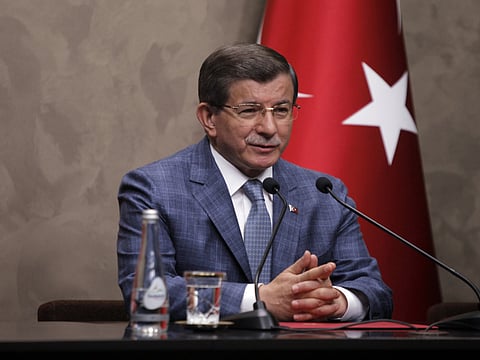Davutoglu’s exit will raise Erdogan’s greed
As a president firmly in control, he will be able to hand-pick a pliant prime minister from his own pool of yes-men to replace the experienced academic

‘Dr [Ahmet] Davutoglu’s intended departure from Turkey’s ruling team”, a former senior Turkish diplomat recently told this writer, “will most likely mark the beginning of the end of President [Recep Tayyip] Erdogan himself.” He went on to say: “By losing decent friends such as the prime minster is neither a good omen for the president nor for the country.” The diplomat added, “As Erdogan conducts Turkey’s regional policy in Europe and in the Middle East, the prime minister has gradually found himself having to tolerate the intolerable president.” The political interpretation of dropping the prime minister indicates to the limitless hunger for power that the president never hesitates to demonstrate.
Interestingly, reports of the prime minister’s decision not to stand for the post at the forthcoming AKP extraordinary congressional meeting, due on May 22, came immediately after the apparent good news from Brussels last Wednesday: That the European Commission approved what Turkey had been demanding for a long time — a recommendation to drop the required entry visa that Turkish nationals needed to obtain before travelling to European Union’s (EU) Schengen zone. For the recommendation to become a binding law, it has to pass through the European Parliament and the Schengen’s member states. Turkey had already gained “candidate status” back in 2005 — a great achievement, paving the way for the country on its path to a full EU integration.
Instead of celebrating the good news from Brussels, in their 90-minute long sudden meeting in Ankara, Erdogan and Davutoglu apparently broke up the otherwise solid partnership they managed to build over the last decade. Davutoglu was unanimously elected as AKP leader during the first extraordinary congress and subsequently succeeded Erdogan as prime minster of the 62nd Government of Turkey. Speculations have it, Erdogan instructed Davutoglu to keep a low profile with his new post, while Erdogan would continue to pursue his foreign and regional policy agenda as the president.
This means only one thing: Preparing the ground for a centrally-controlled presidential system of government, where Erdogan will have the final say on every single issue of importance. The cracks between the two had soon begun to appear as Erdogan became instrumental in forming Davutoglu’s first government. His cabinet has been dominated by Erdogan’s close allies and relatives such as his son-in-law, Energy minister Berat Albayrak, and Deputy Prime Minister Yalcin Akdogan. Their names are among the favourite candidates.
When Davutoglu departs, Erdogan will have an entirely free hand in running Turkey, with his determination to change the constitution to centrally enhance his position as the ruler of Turkey. Many believe that Erdogan is unstoppable in his quest to become probably the most powerful Turkish politician since Mustafa Kemal Ataturk, the founding father of modern Turkey.
As a president firmly in control of the country, Erdogan will be able to hand-pick a pliant prime minister from his own pool to replace the former calculated academic. Davutoglu has shown hardly any disagreement in the past ten years, first as chief advisor to PM Erdogan (2003-2009), second as the minister of Foreign Affairs (2009-2014) and lately as Prime Minister (since June 2015). Only very recently Davutoglu showed some dissent towards Erdogan on a growing list of policies, including clampdown on the freedom of journalists and academics, objection to a central presidential system as well as the deal that Davutoglu had signed with the EU over migrants. Turkey, a country of 78.7 million people, has got 2.75 million Syrian refugees registered with the United Nations — the largest number of refugees in the world hosted by any one single country.
The rift began to surface when Erdogan issued a directive to the AKP hierarchy to strip his prime minister of the key power of selecting and appointing provincial party officials. This was almost simultaneously followed by an ugly online campaign intended to demean Davutoglu, which even went to the extent of calling him a “traitor” who was plotting against his own country. There is no doubt about who had orchestrated such a campaign as many believe that once Davutoglu is out of office, a more powerful Erdogan will emerge with an insatiable thirst for control. The prime minister is not the first victim and is certainly not expected to be the last to be sidelined. He follows Erdogan’s predecessor Abdullah Gul and former deputy prime minister Bulent Arinc.
The showdown in Ankara may seem to be taking place around internal politics, but its effects will be felt beyond Turkey and specifically in the Middle East and in EU politics. The expected tightening of control over Turkey’s regional policy, by Erdogan, with an obedient prime minister, will undoubtedly worry western countries and more significantly — EU. Certainly, the stakes are high. As the Nato’s second-largest army, an already a candidate to join the European club, a crucially important western ally bordering Syria, Iran and Iraq, Turkey, under an ambitious Erdogan, may risk its critical role as a pillar for stability in the regional.
Mustapha Karkouti is a former president of the Foreign Press Association, London.



